#Kyiv 2017
Explore tagged Tumblr posts
Text
When most Americans think of fascism, they picture a Hitlerian hellscape of dramatic action: police raids, violent coups, mass executions. Indeed, such was the savagery of Nazi Germany, Stalinist Russia, and Vichy France. But what many people don’t appreciate about tyranny is its “banality,” Timothy Snyder tells me. “We don’t imagine how a regime change is going to be at the dinner table. The regime change is going to be on the sidewalk. It’s going to be in your whole life.”
Snyder, a Yale history professor and leading scholar of Soviet Russia, was patching into Zoom from a hotel room in Kyiv, where the specter of authoritarianism looms large as Ukraine remains steeped in a yearslong military siege by Vladimir Putin. It was late at night and he was still winding down from, and gearing up for, a packed schedule—from launching an institution dedicated to the documentation of the war, to fundraising for robotic-demining development, to organizing a conference for a new Ukrainian history project. “I’ve had kind of a long day and a long week, and if this were going to be my sartorial first appearance in Vanity Fair, I would really want it to go otherwise,” he joked.
But the rest of our conversation was no laughing matter. It largely centered, to little surprise, on Donald Trump and how the former president has put America on a glide path to fascism. Too many commentators were late to realize this. Snyder, however, has been sounding the alarm since the dawn of Trumpism itself, invoking the cautionary tales of fascist history in his 2017 book, On Tyranny, and in The Road to Unfreedom the year after. It’s been six years since the latter, and Snyder is now out with a new book, On Freedom, a personal and philosophical attempt to flip the valence of America’s most lauded—and loaded—word. “We Americans tend to think that freedom is a matter of things being cleared away, and that capitalism does that work for us. It is a trap to believe in this,” he writes. “Freedom is not an absence but a presence, a life in which we choose multiple commitments and realize combinations of them in the world.”
In an interview with Vanity Fair, which has been edited for length and clarity, Snyder unpacks America’s “strongman fantasy,” encourages Democrats to reclaim the concept of freedom, and critiques journalists for pushing a “war fatigue” narrative about the Russian invasion of Ukraine. “There’s just something so odd about Americans being tired of this war. We can get bored of it or whatever, but how can we be tired?” he asks. “We’re not doing a damn thing.”
Vanity Fair: The things we associate with freedom—free speech, religious liberty—have been co-opted by the Republican Party. Do you think you could walk me through how that happened historically and how Democrats could take that word back?
Timothy Snyder: Yeah. I think the way it happened historically is actually quite dark there. There’s an innocent way of talking about this, which is to say, “Oh, some people believe in negative freedom and some people believe in positive freedom—and negative freedom just means less government and positive freedom means more government.” And when you say it like that, it just sounds like a question of taste. And who knows who’s right?
Whereas historically speaking, to answer your question, the reason why people believe in negative freedom is that they’re enslaving other people, or they are oppressing women, or both. The reason why you say freedom is just keeping the government off my back is that the central government is the only force that’s ever going to enfranchise those slaves. It’s the only force which is ever going to give votes to those women. And so that’s where negative freedom comes from. I’m not saying that everybody who believes in negative freedom now owns slaves or oppresses women, but that’s the tradition. That’s the reason why you would think freedom is negative, which on its face is a totally implausible idea. I mean, the notion that you can just be free because there’s no government makes no sense, unless you’re a heavily drugged anarchist.
And so, as the Republican Party has also become the party of race in our country, it’s become the party of small government. Unfortunately, this idea of freedom then goes along for the ride, because freedom becomes freedom from government. And then the next step is freedom becomes freedom for the market. That seems like a small step, but it’s a huge step because if we believe in free markets, that means that we actually have duties to the market. And Americans have by and large accepted that, even pretty far into the center or into the left. If you say that term, “free market,” Americans pretty generally won’t stop you and say, “Oh, there’s something problematic about that.” But there really is: If the market is free, that means that you have a duty to the market, and the duty is to make sure the government doesn’t intervene in it. And once you make that step, you suddenly find yourself willing to accept that, well, everybody of course has a right to advertise, and I don’t have a right to be free of it. Or freedom of speech isn’t really for me; freedom of speech is for the internet.
And that’s, to a large measure, the world we live in.
You have a quote in the book about this that distills it well: “The countries where people tend to think of freedom as freedom to are doing better by our own measures, which tend to focus on freedom from.”
Yeah, thanks for pulling that out. Even I was a little bit struck by that one. Because if you’re American and you talk about freedom all the time and you also spend all your time judging other countries on freedom, and you decide what the measures are, then you should be close to the top of the list—but you’re not. And then you ask, “Why is that?” When you look at countries like Sweden, Norway, Denmark, France, Germany, or Ireland—that are way ahead of us—they’re having a different conversation about freedom. They don’t seem to talk about freedom as much as we do, but then when they do, they talk about it in terms of enabling people to do things.
And then you realize that an enabled population, a population that has health care and retirement and reliable schools, may be better at defending things like the right to vote and the right to freedom of religion and the right to freedom of speech—the things that we think are essential to freedom. And then you realize, Oh, wait, there can be a positive loop between freedom to and freedom from. And this is the big thing that Americans get a hundred percent wrong. We think there’s a tragic choice between freedom from and freedom to—that you’ve got to choose between negative freedom and positive freedom. And that’s entirely wrong.
What do you make of Kamala Harris’s attempt to redeem the word?
It makes me happy if it’s at the center of a political discussion. And by the way, going back to your first question, it’s interesting how the American right has actually retreated from freedom. It has been central for them for half a century, but they are now actually retreating from it, and they’ve left the ground open for the Democrats. So, politically, I’m glad they’re seizing it—not just because I want them to win, but also because I think on the center left or wherever she is, there’s more of a chance for the word to take on a fuller meaning. Because so long as the Republicans can control the word, it’s always going to mean negative freedom.
I can’t judge the politics that well, but I think it’s philosophically correct and I think we end up being truer to ourselves. Because my big underlying concern as an American is that we have this word which we’ve boxed into a corner and then beaten the pulp out of, and it really doesn’t mean anything anymore. And yet it’s the only imaginable central concept I can think of for American political theory or American political life.
Yeah, it’s conducive to the joy-and-optimism approach that the Democrats are taking to the campaign. Freedom to is about enfranchisement; it’s about empowerment; it’s about mobility.
Totally. Can I jump in there with another thought?
Of course.
I think JD Vance is the logical extension of where freedom as freedom from gets you. Because one of the things you say when freedom is negative—when it’s just freedom from—is that the government is bad, right? You say the government is bad because it’s suppressive. But then you also say government is bad because it can’t do anything. It’s incompetent and it’s dysfunctional. And it’s a small step from there to a JD Vance–type figure who is a doomer, right? He’s a doomer about everything. His politics is a politics of impotence. His whole idea is that government will fail at everything—that there’s no point using government, and in fact, life is just sort of terrible in general. And the only way to lead in life is to kind of be snarky about other people. That’s the whole JD Vance political philosophy. It’s like, “I’m impotent. You’re impotent. We’re all impotent. And therefore let’s be angry.”
Did you watch the debate?
No, I’m afraid I didn’t. I’m in the wrong time zone.
There was a moment that struck me, and I think it would strike you too: Donald Trump openly praised Viktor Orbán, as he has done repeatedly in the past. But he said, explicitly, Orbán is a good guy because he’s a “strongman,” which is a word that he clearly takes to be a compliment, not derogatory. You’ve written about the strongman fantasy in your Substack, so I’m curious: What do you think Trump is appealing to here?
Well, I’m going to answer it in a slightly different way, and then I’ll go back to the way you mean it. I think he’s tapping into one of his own inner fantasies. I think he looks around the world and he sees that there’s a person like Orbán, who’s taken a constitutional system and climbed out of it and has managed to go from being a normal prime minister to essentially being an extraconstitutional figure. And I think that’s what Trump wants for himself. And then, of course, the next step is a Putin-type figure, where he’s now an unquestioned dictator.
For the rest of us, I think he’s tapping—in a minor key—into inexperience, and that was my strongman piece that you kindly mentioned. Americans don’t really think through what it would mean to have a government without the rule of law and the possibility of throwing the bums out. I think we just haven’t thought that through in all of its banality: the neighbors denouncing you, your kids not having social mobility because you maybe did something wrong, having to be afraid all the damn time. African Americans and some immigrants have a sense of this, but in general, Americans don’t get that. They don’t get what that would be like.
So that’s a minor key. The major key, though, is the 20% or so of Americans who really, I think, authentically do want an authoritarian regime, because they would prefer to identify personally with a leader figure and feel good about it rather than enjoy freedom.
You mentioned the word banality, which makes me think of Hannah Arendt’s theory of the “banality of evil.” What would the banality of authoritarianism look like in America?
So let me first talk about the nonbanality of evil, because our version of evil is something like, and I don’t want to be too mean, but it’s something like this: A giant monster rises out of the ocean and then we get it with our F-16s or F-35s or whatever. That’s our version of evil. It’s corporeal, it’s obviously bad, and it can be defeated by dramatic acts of violence.
And we apply that to figures like Hitler or Stalin, and we think, Okay, what happened with Hitler was that he was suddenly defeated by a war. Of course he was defeated by a war, but he did some dramatic and violent things to come to power, but his coming to power also involved a million banalities. It involved a million assimilations, a million changes of what we think of as normal. And it’s our ability to make things normal and abnormal which is so terrifying. It’s like an animal instinct on our part: We can tell what the power wants us to do, and if we don’t think about it, we then do it. In authoritarian conditions, this means that we realize, Oh, the law doesn’t really apply anymore. That means my neighbor could have denounced me for anything, and so I better denounce my neighbor first. And before you know it, you’re in a completely different society, and the banality here is that instead of just walking down the street thinking about your own stuff, you’re thinking, Wait a minute, which of my neighbors is going to denounce me?
Americans think all the time about getting their kids into the right school. What happens in an authoritarian country is that all of that access to social mobility becomes determined by obedience. And as a parent, suddenly you realize you have to be publicly loyal all the time, because one little black mark against you ruins your child’s future. And that’s the banality right there. In Russia, everybody lives like that, because any little thing you do wrong, and your kid has no chance. They get thrown out of school; they can’t go to university.
We don’t imagine how a regime change is going to be at the dinner table. The regime change is going to be on the sidewalk. It’s going to be in your whole life. It’s not going to be some external thing. It’s not like this strongman is just going to be some bad person in the White House, and then eventually the good guys will come and knock him out. When the regime changes, you change and you adapt, and you look around as everyone else is adapting and you realize, Well, everyone else adapting is a new reality for me, and I’m probably going to have to adapt too. Trump wants to be a strongman. He’s already tried a coup d’état. He makes it clear that he wants to be a different regime. And so if you vote him in, you’re basically saying, “Okay, strongman, tell me how to adapt.”
Yeah, we could talk about Project 2025 all day. This new effort to bureaucratize tyranny—which was not in place in 2020—could really make the banal aspect a reality because it’s enforced by the administrative state, which is going to be felt by Americans at a quotidian level.
I agree with what you say. If I were in business, I would be terrified of Project 2025 because what it’s going to lead to is favoritism. You’re never going to get approvals for your stuff unless you’re politically close to administration. It’s going to push us toward a more Hungary-like situation, where the president’s pals’ or Jared Kushner’s pals’ companies are going to do fine. But everybody else is going to have to pay bribes. Everyone else is going to have to make friends.
It’s anticompetitive.
Yeah, it’s going to generate a very, very uneven playing field where certain people are going to be favored and become oligarchs. And most of the rest of us are going to have a hard time. Also, the 40,000 [loyalists Trump wants to replace the administrative state with] are going to be completely incompetent. When people stop getting their Social Security checks, they’re going to realize that the federal government—which they’ve been told is so dysfunctional—actually did do some things. It’s going to be chaos. The only way to get anything done is to have a phone number where you can call somebody at someplace in the government and say, “Make my thing a priority.” The chaos of the administration state feeds into the strongman thing. And since that’s true, the strongman view starts to become natural for you because it’s the only way to get anything done.
You’ve studied Russian information warfare pretty extensively. A few weeks ago the Justice Department indicted two employees of the Russian state media outlet RT for their role in surreptitiously funding a right-wing US media outfit as part of a foreign-influence-peddling scheme, which saw them pull the wool over a bunch of right-wing media personalities. Do you think this type of thing is the tip of the iceberg when it comes to Russian information warfare?
Of course. It’s the tip of the iceberg, and I want to refer back to 2016. It was much bigger in 2016 than we recognized at the time. The things that the Obama administration was concerned with—like the actual penetration of state voting systems and stuff—that was really just nothing compared to all of the internet stuff they had going. And we basically caught zilcho of that before the election itself. And I think the federal government is more aware of it this time, but also the Russians are doing different things this time, no doubt.
I’m afraid what I think is that there are probably an awful lot of people who are doing this—including people who are much more important in the media than those guys—and that there’s just no way we’re going to catch very many of them before November. That’s my gut feeling.
While we’re on Russia, I do want to talk about Ukraine, especially since you’re there right now. I think one of the most unfortunate aspects of [the media’s coverage of] foreign wars—the Ukraine war and also the Israel-Hamas war—is just the way they inevitably fade into the background of the American news cycle, especially if no American boots are on the ground. I’m curious if this dynamic frustrates you as a historian.
Oh, a couple points there. One is, I’m going to point out slightly mean-spiritedly that the stories about war fatigue in Ukraine began in March 2022. As a historian, I am a little bit upset at journalists. I don’t mean the good ones. I don’t mean the guys I just saw who just came back from the front. [I mean] the people who are sitting in DC or New York or wherever, who immediately ginned up this notion of war fatigue and kept asking everybody from the beginning, “When are you going to get tired of this war?” We turned war fatigue into a topos almost instantaneously. And I found that really irresponsible because you’re affecting the discourse. But also, I feel like there was a kind of inbuilt laziness into it. If war fatigue sets in right away, then you have an excuse never to go to the country, and you have an excuse never to figure out what’s going on, and you have an excuse never to figure out why it’s important.
So I was really upset by that, and also because there’s just something so odd about Americans being tired of this war. We can get bored of it or whatever, but how can we be tired? We’re not doing a damn thing. We’re doing nothing. I mean, there’s some great individual Americans who are volunteering and giving supplies and stuff, but as a country, we’re not doing a damn thing. I mean, a tiny percentage of our defense budget—which would be going to other stuff anyway—insead goes to Ukraine.
And by the way, Ukrainians understand that Americans have other things to think about. I was not very far from the front three days ago talking to soldiers, and their basic attitude about the election and us was, like, “Yeah, you got your own things to think about. We understand. It’s not your war.” But as a historian, the thing which troubles me is pace, because with time, all kinds of resources wear down. And the most painful is the Ukrainian human resource. That’s probably a terribly euphemistic word, but people die and people get wounded and people get traumatized. Your own side runs out of stuff.
We were played by the Russians, psychologically, about the way wars are fought. And that stretched out the war. That’s the thing which bothers me most. You win wars with pace and you win wars with surprise. You don’t win wars by allowing the other side to dictate what the rules are and stretching everything out, which is basically what’s happened. And with that has come a certain amount of American distraction and changing the subject and impatience. I think journalists have made a mistake by making it into a kind of consumer thing where they’re sort of instructing the public that it’s okay to be bored or fatigued. And then I think the Biden administration made a mistake by not doing things at pace and allowing every decision to take weeks and months and so on.
What do you think another Trump presidency would mean for the war and for America’s commitment to Ukraine?
I think Trump switches sides and puts American power on the Russian side, effectively. I think Trump cuts off. He’s a bad dealmaker—that’s the problem. I mean, he’s a good entertainer. He’s very talented; he’s very charismatic. In his way, he’s very intelligent, but he’s not a good dealmaker. And a) ending wars is not a deal the way that buying a building is a deal, and b) even if it were, he’s consistently made bad deals his whole career and lost out and gone bankrupt.
So you can’t really trust him with something like this, even if his intentions were good—and I don’t think his intentions are good. Going back to the strongman thing, I think he believes that it’s right and good that the strong defeat and dominate the weak. And I think in his instinctual view of the world, Putin is pretty much the paradigmatic strongman—the one that he admires the most. And because he thinks Putin is strong, Putin will win. The sad irony of all this is that we are so much stronger than Russia. And in my view, the only way Russia can really win is if we flip or if we do nothing. So, because Trump himself is so psychologically weak and wants to look up to another strongman, I think he’s going to flip. But even if I’m wrong about that, I think he’s incompetent to deal with a situation like this. Because he wants the quick affirmation of a deal. And if the other side knows you’re in a hurry, then you’ve already lost from the beginning.
181 notes
·
View notes
Text

Skeletons With Rings Around Their Necks Uncovered at Ancient Cemetery In Ukraine
The discovery of a cemetery in Ukraine from a millennium ago has revealed axes, swords, jewelry and, unexpectedly, buckets around the feet of some of the dead.
Archaeologists in Ukraine have discovered a 1,000-year-old cemetery whose dead were buried with weapons, jewelry and, curiously, buckets around some of their feet.
The 11th-century cemetery is located about 50 miles (80 kilometers) south of Kyiv. Of its 107 graves, "most of the identified burials were deposed in wooden coffins," Vsevolod Ivakin and Vyacheslav Baranov, both archaeologists at the National Academy of Sciences of Ukraine, wrote in a paper they presented at the annual meeting of the Archaeological Institute of America, which was held Jan. 4-7 in Chicago.

The cemetery's dead include both men and women. Some of the men were buried with weapons, such as axes, spearheads and swords, Ivakin and Baranov wrote. A few of the women were buried with elaborate neck rings, which "are found only on necks in female burials and were apparently a kind of social marker," in this region at the time, Baranov said in an email. Some of the people were buried with wooden buckets at their feet, which may have been part of funerary rituals. Other sites that have buckets within burials have been found in the region.
The archaeologists also found a stone altar, as well as bracelets, beads and the remains of food offerings, such as chicken bones and eggshells, among other artifacts. The altar could have been used for Christian or pagan rituals, or possibly both.

Some of the artifacts are similar to those found in the Baltic, hinting that some of the people buried in the cemetery might have come from that region to serve in the militaries of the rulers of Kyiv, such as Volodymyr the Great (who reigned from 980 to 1015) and Yaroslav the Wise (who reigned from 1019 to 1054), the archaeologists noted. The territories that Volodymyr the Great ruled stretched to the Baltic region.
At the time the cemetery was in use, people in Ukraine were converting to Christianity, the researchers said. This included Volodymyr the Great, who left behind his pagan roots and was baptized around 987 before his marriage to Anna, the sister of the Byzantine emperor Basil II.
The researchers excavated the cemetery between 2017 and 2022. The ongoing Russian invasion of Ukraine, however, has paused many excavations in Ukraine, including this one, the archaeologists said.
By Owen Jarus,


#Ukraine#Skeletons With Rings Around Their Necks Uncovered at Ancient Cemetery In Ukraine#ancient grave#ancient tomb#ancient cemetery#ancient artifacts#archeology#archeolgst#history#history news#ancient history#ancient culture#ancient civilizations
339 notes
·
View notes
Text
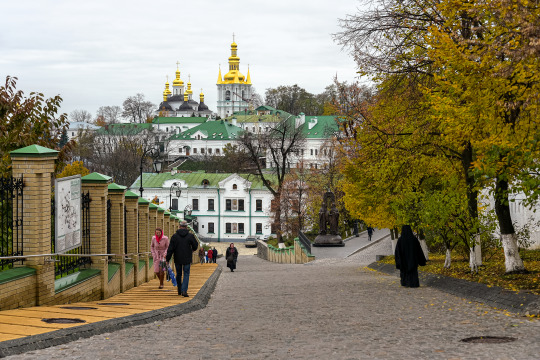
Kyiv, Ukraine. November 2017.
#kyiv#eastern europe#ukraine#orthodox christianity#europe#rooftops#orthodox church#world capitals monastery#cathedral#church#autumn
59 notes
·
View notes
Text
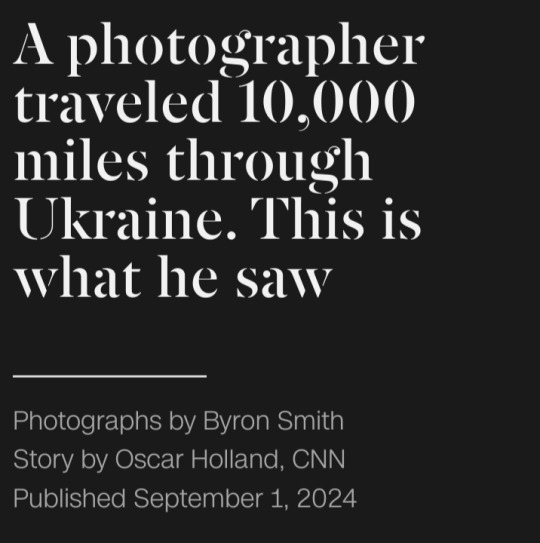


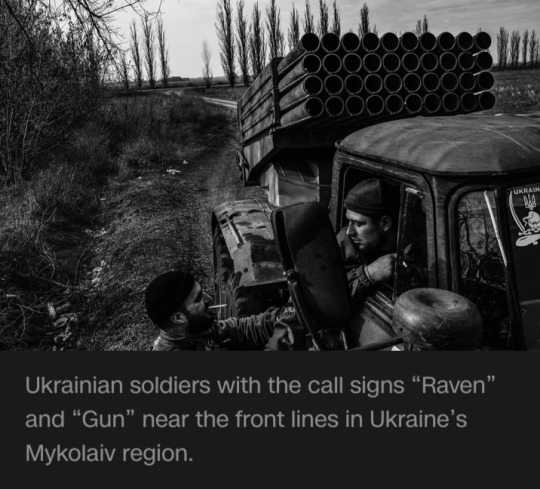




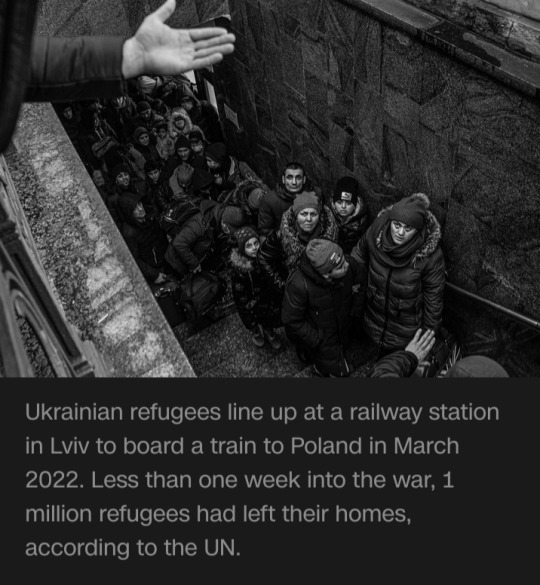
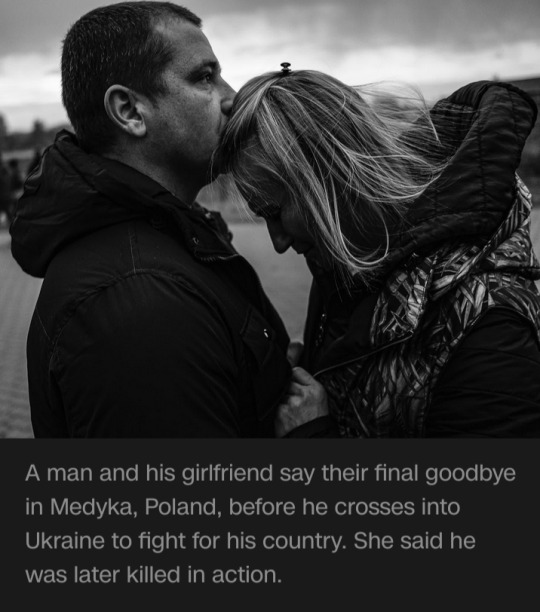
—
In Byron Smith’s new photography book, Ukrainians are pictured fleeing by any means possible — crammed into cars with pet dogs, waiting to board trains to Poland, or simply taking to suburban streets with infants and backpacks in hand.
As a photojournalist whose work often focuses on the plight of migrants (a mission that has taken him from Greek refugee camps to the battle for ISIS-controlled Mosul, Iraq, in 2016 and 2017), his instinct was quite the opposite: to run toward the danger.
“I feel like if you see these masses of people fleeing, it would be fake for me to really sympathize with them if I didn't go and see what they were fleeing from,” Smith told CNN in a video interview from Istanbul, Turkey.
Documenting Smith’s travels through Ukraine in the year following Russia’s unprovoked invasion in February 2022, “Testament ‘22 – A Visual Road Diary Through a War Zone” is a contemplative portrait of a nation at war.
The 192-page tome juxtaposes color with monochrome, defiance with despair, hope with fear.
—
The title references “My Testament,” an 1845 poem by Taras Shevchenko in which the author asks to be buried among the fields, rivers and steppes of his “beloved Ukraine.”
The photographer recalled reading it as he first ventured to Kyiv.
“It's pretty much (Shevchenko’s) last will and testament... And I'm riding into this war zone, the Russians are invading and I’m like, ‘Wow, I actually don't have a will and testament for myself, for my parents or family, or even anything to really leave behind for anybody.’
That played on me a bit, and it became the backbone for the story.”
The book serves, too, as a testament to the people of Ukraine, whose stories Smith felt compelled to share with the world.
Its publisher, Verlag Kettler, believes the photographer’s body of work can contribute to the “overwhelming evidence” of Russian crimes.
xxx
#Ukraine#Byron Smith#war#refugees#victims#photography book#Testament ‘22#Testament ‘22 – A Visual Road Diary Through a War Zone#war zone#Ukrainians#photojournalist#photojournalism#My Testament#Taras Shevchenko#Kyiv#Verlag Kettler#testament#war crimes
41 notes
·
View notes
Text

In 2017, the russians sent Yulia Samoilova to the Eurovision Song Contest in Kyiv, knowing full well that she would not be allowed to enter Ukraine because she illegally visited the occupied Crimea. Then russia shouted to the whole world that people with disabilities are not respected in Ukraine. At that time, russia occupied 7% of the territory of Ukraine and killed thousands of Ukrainians.
In 2023, Anna Smirnova demanded the disqualification of the Ukrainian athlete for 50 minutes because she did not want to shake hands. Unfortunately, Smirnova got her way. At that time, russia occupied almost a quarter of our territory and killed tens of thousands of Ukrainians.
The more evil russia does, the louder russians present themselves as victims.
The only question is, why does the world believe them all the time?
335 notes
·
View notes
Text
My next post in support of Ukraine is:
Next site, the Victoria Museum in Kyiv. Its full name is Приватний музей історичного костюма та стилю Вікторіі Лисенко, which means Victoria Lysenko's private museum of historical costume and style. It's dedicated to showing European fashions from 1850 to 1920. It is the first costume and style museum ever in Ukraine. It's located in a historic mansion from the late 19th century. The museum has over 1,500 exhibits and 200 authentic outfits. The museum opened in 2017 but is temporarily closed at this time. I believe it's been closed since the full-scale invasion started, though I don't know that for sure. But here's an article by the founder of the museum appealing to the world community to help spread the word about the terrorist invasion of Ukraine.
#StandWithUkraine
#СлаваУкраїні 🇺🇦🌻




24 notes
·
View notes
Text

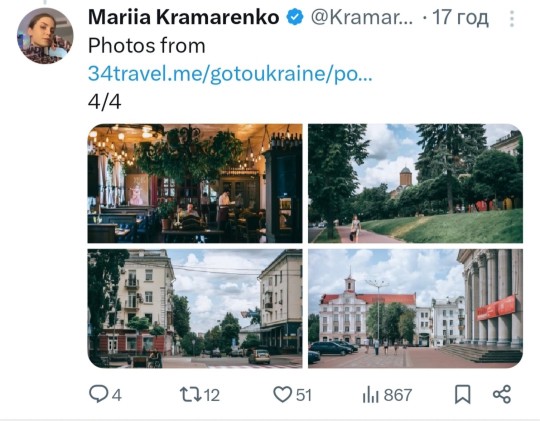
As for me, I lived in Chernihiv for 3 months in 2017 - my Godmother invited me to stay alone in her flat for free (she was abroad) when she learned I struggled to find a place. I had to drive 2 hours for my work in Kyiv😅 But I loved it. Very atmospheric, calm and beautiful city. It is VERY old - 9th century. I would have preferred to live there if I could. My Godmother died from cancer a year later and now Moskovites are destroying that beautiful city too
#chernihiv#ukraine#україна#чернігів#russia is a terrorist state#russian imperialism#russian invasion#russian culture#genocide#war crimes
21 notes
·
View notes
Text
Victoria Amelina
youtube
Victoria Amelina was born in 1986 in Lviv, Ukraine. Amelina's debut novel was published in 2014. Her 2017 novel Dom's Dream Kingdom was shortlisted for the European Union Prize for Literature and the UNESCO City of Literature Prize. In 2021, Amelina received the Joseph Conrad Literary Award from the Polish Institute in Kyiv. Her work has been translated into several languages, including German, English, Italian, and Polish. During the war in Ukraine, Amelina set her writing aside to work for the human rights group Truth Hounds, traveling to liberated areas to record the testimonies of witnesses and survivors of Russian crimes.
Victoria Amelina died in 2023 at the age of 37 from injuries sustained in a missile strike.
36 notes
·
View notes
Text
Eurovision Fact #718:

A group of former Eurovision contestants are going on tour together across Europe and Australia for "Eurovision On Tour 2024." The concert series will begin in October and finish in January of 2025.
The group behind the idea for the tour, Eurodrama Entertainment SL, also produces the Barcelona Eurovision Party and Nordic Eurovision Party.
The artists who have confirmed their participation in the concert event are:
Silia Kapsis (Cyprus 2024), Carola (Sweden 1983, 1991, 2006), Emmelie de Forest (Denmark 2013), Linda Martin (Ireland 1984, 1992), The Roop (Lithuania 2021), Destiny (Malta 2021) and Sunstroke Project (Moldova 2010, 2017).
[Sources]
"Eurovision on Tour to bring winners, icons and favourites to fans," Eurovision.tv.
Participants of Malmö 2024: Silia Kapsis, Eurovision.tv.
Participants of Munich 1983: Carola Häggkvist, Eurovision.tv.
Participants of Rome 1991: Carola, Eurovision.tv.
Participants of Athens 2006: Carola, Eurovision.tv.
Participants of Malmö 2023: Emmelie de Forest, Eurovision.tv.
Participants of Malmö 1992: Linda Martin, Eurovision.tv.
Participants of Luxembourg 1984: Linda Martin, Eurovision.tv.
Participants of Rotterdam 2021: The Roop, Eurovision.tv.
Participants of Rotterdam 2021: Destiny, Eurovision.tv.
Participants of Oslo 2010: Sunstroke Project & Olia Tira, Eurovision.tv.
Participants of Kyiv 2017: Sunstroke Project, Eurovision.tv.
#esc facts oc#eurovision#eurovision song contest#esc#eurovision facts oc#Eurovision on tour#Eurovision on tour 2024#esc 2024#Silia Kapsis#Carola#Emmelie de Forest#Linda Martin#The Roop#Destiny#destiny chukunyere#Sunstroke Project#esc winners#esc 1983#esc 1991#esc 2006#Carola Häggkvist#esc 2013#esc 1992#esc 1984#esc 2021#ecs 2010#esc 2017
15 notes
·
View notes
Text
My autobiography

‘’Khalil Ibrahim Hijazi’’ (Arabic: خليل إبراهيم حجازي; born June 4, 1977, Kuwait) — I am an ophthalmologist, eye microsurgeon, Doctor of Medical Sciences, and Associate Professor. I am the founder and chief physician of the “Hayat Eye” Eye Clinic, a leading center for clinical ophthalmology and microsurgery in Turkey. My expertise includes eye surgery, corneal transplantation, retinal disease treatment, and cataract surgery.
Biography
I was born on June 4, 1977, in Kuwait. My father is Ibrahim Hijazi and my mother is Mir Hijazi. After graduating from secondary school in 1995 and completing a one-year Russian language preparatory course, I entered Bogomolets National Medical University in Kyiv, Ukraine, and graduated in 2002.
I completed my specialization at the Crimean State Medical University named after S. I. Georgievsky (now part of the Medical Academy named after Georgievsky at Crimea Federal University). I then undertook postgraduate studies at Luhansk State Medical University. In 2011, I defended my Ph.D. thesis at the Filatov Institute of Eye Diseases and Tissue Therapy in Odesa. I also received additional clinical training at my alma mater in Kyiv.
Professional Career
Since 2006, I have worked as a practicing eye surgeon. Between 2006 and 2012, I served in various public hospitals in Ukraine, including in Luhansk, Kyiv, and Odesa. In 2009, I entered postgraduate study at the Filatov Institute of Eye Diseases and Tissue Therapy, where I continued my clinical and research activities.
In 2013, I moved to Syria, where I founded surgical departments for ophthalmologic operations and trained local physicians. In 2017, I returned to Turkey and worked in private clinics in Gaziantep, Antakya, Bursa, and Istanbul. In 2019, I founded my own clinic, Hayat Eye.
Clinical Achievements and Innovations
I am known for introducing innovative techniques in the treatment of eye diseases, including advanced micro- and laser surgery. I was among the first doctors in Turkey to apply modern corneal transplant methods and laser-assisted treatment of retinal disorders. I am particularly known for treating rare and complex ophthalmic conditions, achieving high surgical success rates.
Leadership and Projects
I am active in international scientific and medical organizations, often holding leadership positions. I conduct seminars and training sessions to improve physician qualifications and participate in international research initiatives. I also develop and implement educational programs for young ophthalmologists.
Scientific Publications
I am the author of multiple scientific publications in ophthalmology, including articles in journals indexed in PubMed and Scopus. My research focuses on new surgical techniques and corneal transplantation.
Educational Initiatives
I regularly conduct training courses for physicians and medical students. I am a frequent speaker at international conferences and the author of educational programs for medical schools and continuing education.
International Recognition
I have gained international recognition for my work, presenting at global conferences and symposia. I am a member of several professional organizations, including:
International Agency for the Prevention of Blindness (IAPB)
International Eye Foundation (IEF)
Role at “Hayat Eye” Clinic
In 2019, I founded the Hayat Eye Clinic in Istanbul, specializing in the diagnosis, treatment, and surgery of eye conditions. The clinic is equipped with state-of-the-art technology and staffed by a team of highly trained professionals who undergo regular professional development.
Peer Recognition
I am highly respected by my colleagues for my professionalism, precision, and innovative approach to complex ophthalmological problems.
Media and Interviews
I frequently appear in the media as an expert in ophthalmology. I have been interviewed by medical journals and TV channels and am often cited in discussions on trends in eye surgery.
Awards and Titles
I am a member of the Arab Medical Association and have received several awards for my contributions to ophthalmology and innovation in medical practice.
Conferences
Conferences at the Filatov Institute of Eye Diseases (Odesa):
XI Ukrainian Congress of Ophthalmologists — 2006 (70th Anniversary of the Institute)
XII Ukrainian Congress of Ophthalmologists — 2010 (Scientific Research and Clinical Practice)
Filatov Readings — Annual Scientific Conference
Interregional Ophthalmology Conference, Luhansk — 2011
Conferences at Shubakov Health University (Kyiv):
“Advances in Ophthalmology” — October 2010
International Conferences and Exhibitions:
7th European Congress of Neuro-Ophthalmology (EUNOS 2005), Moscow
Russian National Congress “Modern Techniques in Cataract and Refractive Surgery”, Moscow
“East–West” Conference, Ufa — 2012 (with participation from Germany, Japan, Belgium)
International Exhibition “Ophthalmology — 2012”
Retina Congress USA — 2012
Russian National Ophthalmology Forum — 2011
International Cataract and Refractive Surgery Conference — 2008
Major Works
I am the author of numerous scientific papers and monographs on contemporary treatment methods in ophthalmology.
2 notes
·
View notes
Note
hehehe hiiii this is my list of lyric changes in live performances of michael (all gathered from concert recordings on youtube), there are almost definitely even more changes that i havent seen yet but these are the ones ive found from my phase of watching over 30 live performances of michael on youtube
lines like ‘im sexy’ replaced with ‘you’re sexy’ , other ‘i’ statements replaced with ‘you’ sometimes
‘sticky hips’ part of chorus skipped over sometimes idk why tbh
‘it’s close now’ sometimes replaced with ‘you’re close now’
at pinkpop performance ‘it’s close now’ was replaced with ‘so pink now’ .
typically in the second ‘so come and dance with me’ section, the last ‘so come and dance with me’ is replaced with ‘so come all over me’ . sometimes this does not happen, and sometimes it also happens in the first ‘so come and dance with me’ section. less common tho
in their first US show performance of micheal, the final ‘so come and dance with me’s of each section are replaced with ‘so break a [unintelligible] with me’. might say hall or wall?
sometimes says ‘micheal you’re dancing, you’re a beautiful dance-whore’ instead of ‘micheal you’re dancing like a beautiful dance-whore’
music for life 2017 performance of micheal he says “this is what i am, your favourite man” instead of “i am a man” in the bit right before the main chorus bit (he said “i am a man” earlier however). TRNSMT festival 2018 he says your favourite man also, says it first time and fhen second time says “spectacular man” im thinking these lyric changes are common in the more recent performances of it?
earliest recorded performance of it it is quite literally not possible to tell if there are any lyric changes however it’s possible the come and dance with me change was included
2022 just like heaven fest performance he says either “this is what i am / yes, such a fine man” or “this is what i am / you’re such a fine man” in the first chorus. in the second chorus he sings “this is what i am / i’m an ice cream man”
rock n heim 2013 says ‘because’ in beginning of main chorus (‘because you’re all that i see [etc.]’)
spancirfest 2023 he says “this is what i am / banana (?) toast man”. seems to be part of a general trend in more recent performances where he says a food instead of just ‘a man’.
2010 mexico performance he sings “stubble on my sticky hips”, possibly deliberate, possibly just a mispeak. may happen in other performances too?
2018 kyiv performance sings ‘flamboyant man’. also sings “you’re all i need” first verse instead of “you’re all i see”
according to alex’s twitter, he makes up new lyrics each performance.
YOU'RE A SAINT FOR THIS AND ALEX KNOWS WHAT HE'S DOING
we've been blessed by this list thank you
i'm going to check later what he did at paradiso amsterdam live cause i have it on cd but i remember that there were some changes
so come all over me change is my favourite thing ever fr😭😭😭
15 notes
·
View notes
Text
An air raid alert has just started when Victoria Itskovych joins a Zoom call from Kyiv. “It’s, like, a usual situation,” she says. “But really, it’s not usual.” February 24 will mark the second anniversary of Russia’s full-scale invasion of Ukraine. For nearly two years now, Kyiv has been under bombardment. Some weeks, people have to trudge to their shelters night after night, checking text alerts and Telegram channels to figure out where the missiles are falling and when it’s safe to come out—although, it’s never really safe.
That relentless stress, and the trauma of losing family, friends, and colleagues on the front, has taken its toll. A poll by the city government last year found that 80 percent of residents reported symptoms of post-traumatic stress disorder. Russia’s full-scale invasion of Ukraine has exposed the whole of Ukrainian society to battle shock. “We’ve all suffered from this,” says Itskovych, who is director of the Kyiv City Council’s IT department. “Almost every person has somebody who was injured or died during the war, or lost their home or lost their health.”
In the face of such widespread injury, the Kyiv government has turned to Ukraine’s now-famous civic tech infrastructure for help. As the war enters its third year, the municipal government is starting to build a citywide system for providing mental health support to citizens. It’s a vast challenge, but also a unique opportunity—the first time that such a mass-trauma event has happened to a society that has already built the tools of digital government. Dealing with the mental health impacts of the invasion will be absolutely vital to keep society resilient, functioning, and committed enough to repel the invaders. It’s also the key to Ukraine’s postwar recovery, laying the groundwork now for a society that can rebuild itself physically and psychologically from the horrors of war. “This is the future of our society,” Itskovych says. “We are building the basis for the resilience of the community itself.”
At the heart of the plan is the Kyiv government’s digital platform, Kyiv Digital, which it launched in 2017. Before the invasion, it was largely used to manage parking and public transport, and to notify residents of disruptions to services such as road closures or power outages. When the war began, those notifications became more urgent: incoming attacks, the locations of bomb shelters, and the safest routes to reach them. Like other parts of Ukraine’s civilian technology, the city pivoted its tools to keep people safe and support the war effort, bootstrapping and rewiring the systems at pace.
“The first changes to the notifications we did in hours,” says Oleg Polovynko, adviser on digitalization to Kyiv’s mayor. Since then, the digital teams have been engaged in a constant cycle of innovation, trying to figure out what services they can bring online. The war has pushed them to act more quickly, to adapt tools they have and invent things that don’t exist.
They’ve expanded tools for civic participation, letting citizens vote on petitions, send feedback to the city government, and ask for help, such as financial support to repair bomb-damaged homes. And they’ve collected a lot of data, which is how the Kyiv government has been able to measure the scale of the city’s distress—and people’s reluctance to seek help. Of the 80 percent of residents who show signs of trauma, “40 to 45 percent are afraid to have contact with doctors who can help,” Polovynko says.
But this is only half of the problem that needs solving. For those who do want to seek treatment, there simply aren’t enough resources to help them. Clinical psychologists are supposed to limit the number of patient consultations they do in a day, so they don’t burn out. Before the full-scale invasion, Inna Davydenko saw a maximum of four patients daily. Today, Davydenko, a mental health specialist at the City Center of Neurorehabilitation in Kyiv, sees twice that number. When we speak, she’s just finished a video call with a soldier stationed near the front, whom she’s helping cope with stress and anxiety.
Even before the war massively increased the number of people dealing with trauma, depression, and anxiety, Ukraine’s medical system suffered from an underinvestment in mental health provision. “In most hospitals, you have maybe one psychologist. In good hospitals, it’s maybe two,” Davydenko says. “A lot of people need psychological help, but we can’t cover everything.” There is simply no way that the current system can grow to match the enormous jump in demand. But, Davydenko says, “almost every Ukrainian person has a smartphone.”
This is exactly what Polovynko and Itskovych want to exploit, using Kyiv Digital’s platforms and data to digitize mental health support for the city, and so close the gap between need and resources. Their project will focus first on those they’ve identified as being most vulnerable—war veterans and children—and those most able to help others: teachers and parents. The next six months of the project will be a “discovery stage,” Polovynko says. “We need to understand the real life of our veterans now, of the children, of the parents, what’s their context, how they survive, what services they use.”
The project will track people through the process of recovering from trauma, monitoring the treatments they ask for and the ones they receive, their concerns as they move through the mental health system, and their outcomes. Once the team has a detailed map of services and bottlenecks, and data on what’s working and what’s not, they can match individual needs with treatments. A full roll-out is scheduled for early 2025.
“It doesn't mean that the whole chain of the service will be absolutely digital,” Itskovych says. Some patients may be directed to group therapy or one-on-one meetings with psychologists, others will be given access to online tools. The aim, she says, is to create efficiency, to close the service gap, but also to provide comfort, meeting people where they are. “For a big part of our clients, there is more comfort with getting the service online, in different ways. Some people are not comfortable meeting a specialist one-on-one; they prefer a digital way to get the service.”
The project is being supported financially and operationally by Bloomberg Philanthropies, a charitable organization created by former New York mayor and Bloomberg founder Michael Bloomberg. James Anderson, head of government innovation at the organization, says that the project comes at a critical time for Kyiv, where people continue to suffer even though global attention has shifted away to other crises.
“There's always a tremendous amount of attention when the immediate crisis hits,” Anderson says. “But mayors continue to have to deal with the human costs of crises, long after the newspapers have turned to new subjects. That’s certainly what we sense and see in Kyiv.”
The size of the challenge in Kyiv is clearly daunting. But, Anderson says, there are reasons for optimism. Cities have got better over the past two decades at responding to common crises, such as Covid-19, which also required rapid, mass digitization of services. “Every crisis is distinct and different, and awful, in its own way,” Anderson says, “but there are lessons learned.” The Kyiv government, and Ukrainian society more widely, have demonstrated a capacity for rapid innovation to meet urgent needs, and Anderson hopes that success in this project could see it replicated internationally. “This is not the last war. This is not the last crisis,” he says. “I think Kyiv has lessons that they can share with cities around the globe.”
For Kyiv, and Ukraine, the crisis won’t end when the war does. “Psychological health is the number one problem for Ukraine,” Davydenko says, before correcting herself. “Number one is Russia, number two is our psychological health,” she says. “PTSD is our future.”
124 notes
·
View notes
Text
Oksanen describes herself as a post-colonial writer. East Europeans went through totalitarianism twice – first with the Nazis, and then for nearly half a century, under the Soviets, she says. Typically, though, the experiences of those who lived behind the iron curtain “do not find a place” in the west’s cultural consciousness. Without a reckoning of Russia’s“colonial” crimes, where the present echoes the lurid past, justice is impossible, she thinks.
Same River, Twice is thoughtful, instructive and deeply harrowing. Today’s anti-Kyiv Kremlin rhetoric has deep historical roots, she points out. Stalin demonised the Estonians and other rebellious ethnic groups as “fascists” – an enemy within. The state film industry in Moscow cast actors from the Baltic Soviet republics in the role of Nazis or American spies. Under communism, “fascist” became a synonym for non-Russians.
In the run-up to his Ukraine attack Putin reactivated this “dehumanising and racist” language. Russia’s president said his “special military operation” was necessary to free Kyiv from “neo-Nazis”. The claim is absurd. Ukraine’s president, Volodymyr Zelenskyy, is Jewish. Most of his male relatives perished during the second world war fighting against German invaders. Zelenskyy’s defence minister is a Muslim Tatar from Crimea.
The book makes a compelling case that misogyny and imperialism are linked. At the same time as killing Ukrainians, Putin has rolled up women’s rights within Russia. In 2017 the pro-Kremlin Duma effectively legalised domestic abuse. Russia’s patriarch argued that criminal sanctions for men who hit women amounted to foreign interference. There was, one female deputy argued, nothing wrong with a mere “slap”.
Putin’s regime likes to portray itself as bastion of conservative Christian Orthodoxy. It has restricted the rights of sexual minorities and denigrates feminists as terrorists and extremists. “Russia is a classic example of a patriarchal authoritarian state,” Oksanen says. In contrast to Baltic and Nordic countries, where talented female politicians become president or prime minister, women are mostly absent from the top levels of Russian political life.
2 notes
·
View notes
Text
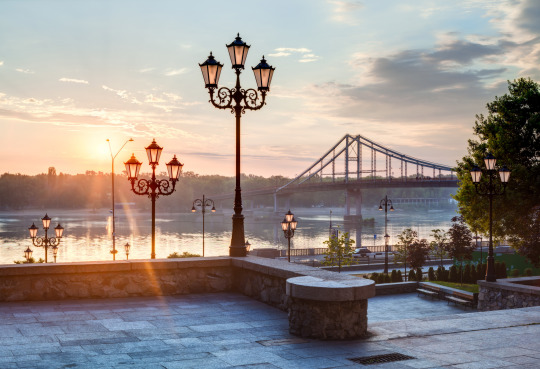
Sunrise at Parkovyi footbridge in Kyiv, Ukraine. 18th June 2017.
#kyiv#ukraine#dnipro river#summer#june#european capitals#world capitals#eastern europe#dawn#sunrise#river#europe
71 notes
·
View notes
Text
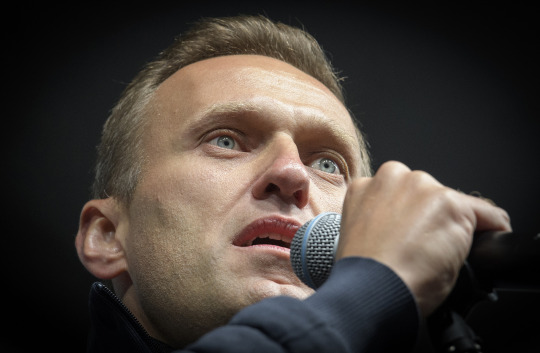
Alexei Navalny, who has died suddenly aged 47 while in prison, was Russia’s best-known campaigner against high-level corruption. For many years he was the leading critic and opponent of President Vladimir Putin and his political party, United Russia.
Repeated arrests, jail sentences and physical assaults did not deter Navalny from digging up financial scandals, which he published on his blogs and X feeds as well as YouTube. In a 2011 radio interview, he described United Russia as a “party of crooks and thieves”, which became a powerful and popular mantra on social media and at political protests.
Repression did not stop him attracting enthusiastic crowds in support of opposition politicians in local elections in cities across Russia. Occasionally he ran for office himself, most notably in 2013 for the mayoralty of Moscow, when the official result gave him 27% of the vote – which he said was rigged so as to deny him victory.
In 2016, Navalny launched a campaign for the 2018 presidential election but was barred by Russia’s central election commission due to a prior criminal conviction. In 2017 he was attacked with a spray, leaving him partially blind in one eye. In 2019 Navalny fell ill in prison, from what he claimed was poison. His most dramatic brush with death came in 2020 at the end of a political campaign trip through Siberia, when he was taken seriously ill on a flight from Tomsk to Moscow. His condition was so grave that the pilot made an emergency landing in Omsk, where he was rushed to hospital. Navalny’s wife and supporters asked for him to be taken to Germany, where they felt he would be better treated.
The Russian authorities agreed and Navalny was flown to the Charité hospital in Berlin, where toxicology tests showed traces of the nerve agent novichok in Navalny’s body. Russian officials complained that the test results were not made public nor disclosed to them. Navalny recovered and was released from hospital after a month.
He decided to convalesce for several weeks in Germany. Russian court authorities announced that if he returned late to Moscow he would be jailed for breaking the terms of a probation order. The threat was seen as a device to deter Navalny from returning to Russia in the hope, as the authorities saw it, that in exile his influence would rapidly decline.
Showing great courage, but defying the advice of his family and friends, he flew back to Moscow in January 2021, accompanied by his wife and dozens of journalists, and was arrested on landing. His Anti-Corruption Foundation promptly published on YouTube an investigation with pictures of a luxury multimillion-dollar mansion on the Black Sea, which they dubbed Putin’s palace.
Navalny’s stock had never been higher at home or abroad, and when a court gave him a two-and-a-half year sentence, western political leaders, including the US president, Joe Biden, protested openly and imposed sanctions. But Putin was determined to destroy him politically.
In 2022, Navalny was sentenced to an extra nine years after being found guilty of embezzlement and contempt of court. In 2023, he was given a further 19 years in prison on extremism charges.
Navalny was born in Butyn and grew up mainly in Obninsk, a small town south-west of Moscow. His mother, Lyudmila, worked as a lab technician in micro-electronics and then moved to a timber-processing factory. His father, Anatoly, a Ukrainian, was in the military. In addition to Russian, Alexei learned Ukrainian through spending summers with his grandmother near Kyiv. He gained a law degree (1998) at the Peoples’ Friendship University in Moscow.
In 2000 he joined the United Democratic party, known as Yabloko. Under its leader, Grigory Yavlinsky, the party stood for liberal and social democratic values. Navalny gained an economics degree at the Financial University (2001), and from 2004 to 2007 served as chief of staff of the Moscow branch of Yabloko. A charismatic speaker, he was attracted by the concept of television debates, and in 2005 founded a social movement for young people, with a name taken from the Russian word for yes, DA! – Democratic Alternative, which was active in the media.
Navalny started to move gradually to the right, and in 2007 he was expelled from Yabloko after clashing with Yavlinsky over Navalny’s increasingly nationalist and anti-immigrant views.
He then co-founded a movement known as Narod (The People), which aimed to defend the rights of ethnic Russians and restrict immigration from Central Asia and the Caucasus. A year later he joined two other Russian nationalist groupings, Movement Against Illegal Immigration (MAII) and Great Russia, in forming a new coalition called the Russian National Movement.
It made little impact and Navalny turned his attention to journalistic muckraking. His main outlet was a blog, LiveJournal. In 2010 he published leaked documents about the alleged theft by directors of millions of roubles from the pipeline company Transneft. The following year he exposed a scandalous property deal between the Russian and Hungarian governments. He decided to establish the Anti-Corruption Foundation, which continued until his death.
He also went back into electoral politics, leading street protests over unfair practices by United Russia. Navalny urged people to vote any way they liked in the 2011 parliamentary elections, including for the Communist party, so long as they voted against United Russia. He was tempted to run against Putin in the 2012 contest for the presidency, but said the ballot would be rigged. After the poll, he led several anti-Putin rallies in Moscow and was briefly arrested.
The following year Moscow was to elect its mayor. Navalny registered as one of six candidates. The next day he was sentenced to five years on embezzlement and fraud charges. Initially he called for an election boycott, but when he was released on appeal he changed his mind. Some analysts speculated that Putin wanted him to run to make the electoral contest look genuinely open. Navalny lost to the incumbent mayor and Kremlin ally Sergei Sobyanin, but claimed to have won. In 2016 he announced he would stand against Putin in the 2018 presidential contest. More arrests and repression followed.
Navalny’s nationalism put him in agreement with Putin on one major issue: Crimea. The territory had been ceded to Ukraine in 1954, but in 2014 Putin used force to reincorporate it into Russia. Navalny said he would not return it to Ukraine if he had the power to do so. Like Putin, he argued that Ukraine was an artificial construct. “I don’t see any kind of difference at all between Russians and Ukrainians,” he said, while admitting his views might provoke “horrible indignation” in Ukraine.
However, his agreement with some of Putin’s views on Ukraine did not bring him to support Putin’s invasion of Ukraine in February 2022. That March, Navalny released a statement from jail. Through his spokesman he urged Russians “to overcome their fear” and take to the streets and demand a “stop to the war” against Ukraine. He called Putin an “obviously insane tsar”. “If in order to stop the war we have to fill prisons and paddy wagons with ourselves, we will fill prisons and paddy wagons with ourselves.”
“Everything has a price, and now, in the spring of 2022, we must pay this price. There’s no one to do it for us. Let’s not ‘be against the war’. Let’s fight against the war.” At the end of 2023 he was transferred to the remote penal colony at Kharp, north of the Arctic circle.
In 2000 he married Yulia Abrosimova, and she and their daughter, Daria, and son, Zakhar, survive him.
🔔 Alexei Anatolievich Navalny, politician and anti-corruption campaigner, born 4 June 1976; died 16 February 2024
Daily inspiration. Discover more photos at Just for Books…?
16 notes
·
View notes
Text
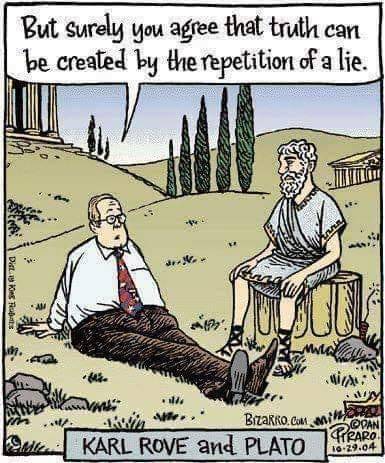
[Dan Piraro]
* * * *
A watershed moment for the truth.
February 16, 2024
ROBERT B. HUBBELL
On a day bristling with important news, the criminal indictment of the “star” witness against President Biden and Hunter Biden in the impeachment inquiry was a watershed moment for the truth. Per the indictment, the GOP’s primary source of allegations of corruption against President Biden lied to FBI agents, concocting a fiction for MAGA media outlets and politicians eager to spread slanderous statements.
The revelation that the “impeachment inquiry” against Biden was built on a house of lies comes hard on the heels of an admission from one of the primary proponents of the 2020 election fraud conspiracy theory that it has no evidence to support its allegations of widespread fraud!
Together, the false stories of “Biden’s corruption” and “election fraud” were major components of the GOP playbook in the 2024 presidential election. Those narratives have now collapsed in a spectacular implosion. That collapse is good for President Biden politically—but the immediate political ramification is not the most important point.
The major takeaway is this: The Republican party is built on lies and sustains itself through lies. They know it. We know it. The media knows it. But now, we have proof that the bad-faith headlines, breathless “whataboutism,” and lazy “both-siderism” of the media are part of a disinformation campaign that must stop.
These twin developments are a watershed moment for the truth.
Let’s take a look.
DOJ indicts FBI informant who was the primary source for allegations of corruption against Joe Biden.
The House “impeachment” inquiry has been a conspiracy theory in search of evidence from the start. House Oversight Chair James Comer took testimony from disgruntled IRS agents with no personal knowledge (but plenty of opinions) and from Hunter Biden’s business partner, who said Joe Biden never participated in his son’s business dealings.
Desperate for proof, Republicans turned to a confidential source, Alexander Smirnov, who claimed to have personal knowledge of alleged bribery ($5 million) by then former Vice President Biden arising from Hunter Biden’s involvement in a Ukrainian energy company (“Burisma”).
On Thursday, a grand jury in the Central District of California issued an indictment against Smirnov for lying to the FBI. The indictment is here: US v. Smirnov | Indictment No. 2:24-CR-00091-ODW. For a summary of the indictment and related details, see NYTimes, Ex-F.B.I. Informant Is Charged With Lying Over Bidens’ Role in Ukraine Business.
Per the Times,
The longtime informant, Alexander Smirnov, 43, is accused of falsely telling the F.B.I. that Hunter Biden, then a paid board member of the energy giant Burisma, demanded the money to protect the company from an investigation by the country’s prosecutor general at the time.
Importantly, the indictment alleges a political motivation for Smirnov to lie about Biden:
Mr. Smirnov’s motivation for lying, prosecutors wrote, appears to have been political. During the 2020 campaign, he sent his F.B.I. handler “a series of messages expressing bias” against Joseph R. Biden Jr., including texts, replete with typos and misspellings, boasting that he had information that would put him in jail.
Smirnov’s allegations were demonstrably false, as explained by the Times:
In 2015 or 2016, Hunter Biden promised to protect the company “through his dad, from all kinds of problems,” Mr. Smirnov falsely claimed to his bureau handler in 2020, according to Mr. Weiss, who has charged the president’s son twice over the past year on tax and gun charges. This claim was easily disproved, prosecutors said: Mr. Smirnov was only in contact with Burisma executives in 2017, after Mr. Biden left office — when he “had no ability to influence U.S. policy.” Mr. Smirnov told F.B.I. investigators that he had seen footage of Hunter Biden entering a hotel in Kyiv, Ukraine, that was “wired” by the Russians, suggesting that Russia may have recorded phone calls made by Mr. Biden from the hotel, according to the indictment.
But Mr. Biden had never been to Ukraine, let alone that hotel, prosecutors wrote.
Importantly, the indictment was obtained by special counsel David C. Weiss, who was appointed by Merrick Garland to investigate Hunter Biden. Weiss—who was first appointed as a US Attorney by Donald Trump—has obtained two indictments against Hunter Biden for gun possession and tax evasion charges.
The fact that Smirnov was indicted by the special counsel appointed to investigate Hunter Biden rebuts any notion that the indictment is politically motivated.
Smirnov’s false statements provided the only substantive allegations in the sham “impeachment inquiry” in the House and received massive coverage by an eager news media (especially on Fox News). Those news organizations should retract or correct their previous reporting. It is not enough to report on the indictment of Smirnov.
The most important point is that the GOP’s narrative of a “Biden crime family” is a fiction based on perjured statements provided to the FBI! Tell a friend!
[MORE]
#Robert B. Hubbell Newsletter#Robert B. Hubbell#sham impeachment inquiry#corrupt GOP#corrupt House GOP#Ukraine#Smirnov#Smirnov's false statements
11 notes
·
View notes